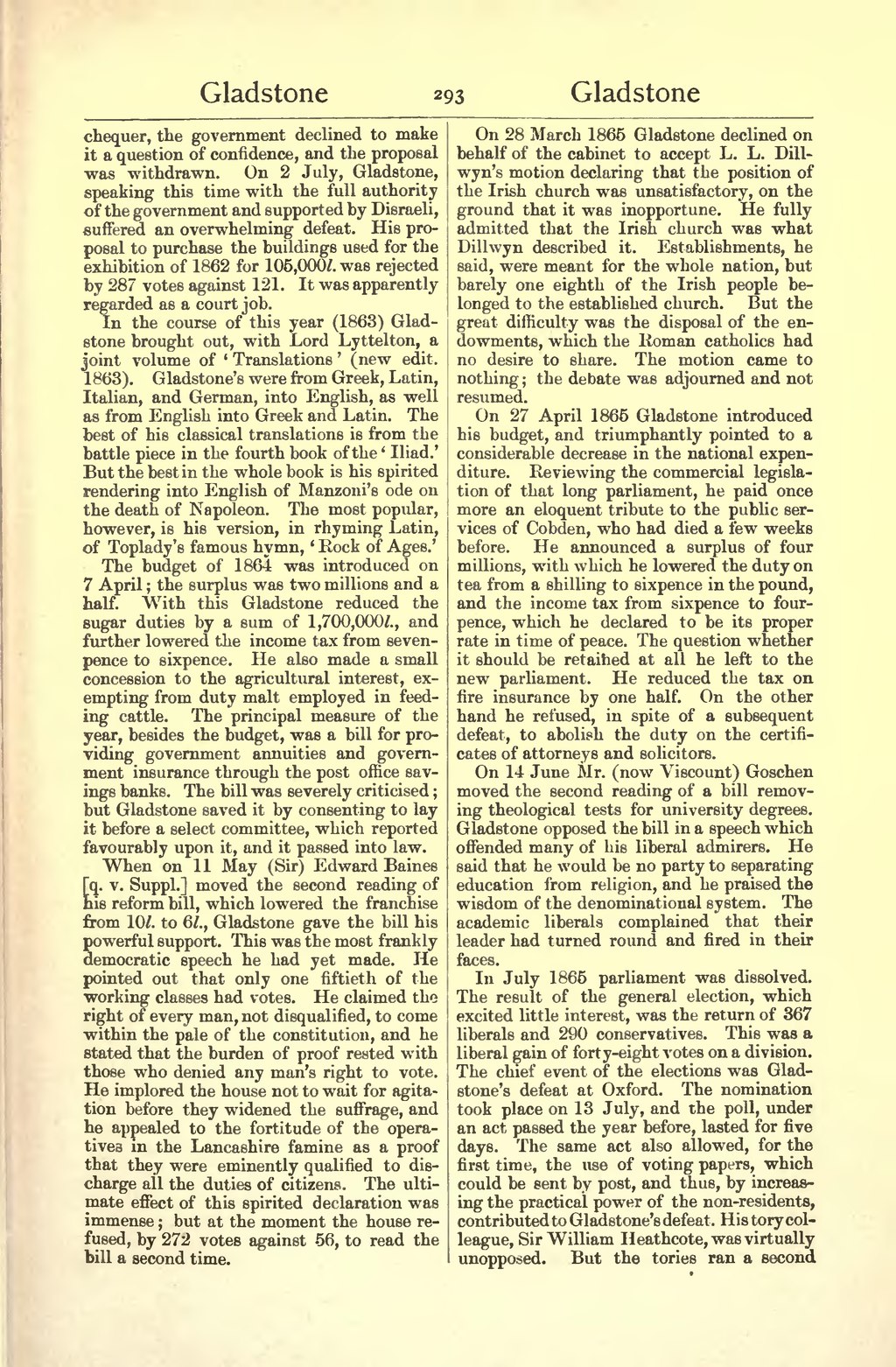chequer, the government declined to make it a question of confidence, and the proposal was withdrawn. On 2 July, Gladstone, speaking this time with the full authority of the government and supported by Disraeli, suffered an overwhelming defeat. His proposal to purchase the buildings used for the exhibition of 1862 for 105,000l. was rejected by 287 votes against 121. It was apparently regarded as a court job.
In the course of this year (1863) Gladstone brought out, with Lord Lyttelton, a joint volume of 'Translations' (new edit. 1863). Gladstone's were from Greek, Latin, Italian, and German, into English, as well as from English into Greek and Latin. The best of his classical translations is from the battle piece in the fourth book of the 'Iliad.' But the best in the whole book is his spirited rendering into English of Manzoni's ode on the death of Napoleon. The most popular, however, is his version, in rhyming Latin, of Toplady's famous hymn, 'Rock of Ages.'
The budget of 1864 was introduced on 7 April; the surplus was two millions and a half. With this Gladstone reduced the sugar duties by a sum of 1,700,000l., and further lowered the income tax from sevenpence to sixpence. He also made a small concession to the agricultural interest, exempting from duty malt employed in feeding cattle. The principal measure of the year, besides the budget, was a bill for providing government annuities and government insurance through the post office savings banks. The bill was severely criticised; but Gladstone saved it by consenting to lay it before a select committee, which reported favourably upon it, and it passed into law.
When on 11 May (Sir) Edward Baines [q. v. Suppl.] moved the second reading of his reform bill, which lowered the franchise from 10l to 6l., Gladstone gave the bill his powerful support. This was the most frankly democratic speech he had yet made. He pointed out that only one fiftieth of the working classes had votes. He claimed the right of every man, not disqualified, to come within the pale of the constitution, and he stated that the burden of proof rested with those who denied any man's right to vote. He implored the house not to wait for agitation before they widened the suffrage, and he appealed to the fortitude of the operatives in the Lancashire famine as a proof that they were eminently qualified to discharge ail the duties of citizens. The ultimate effect of this spirited declaration was immense; but at the moment the house refused, by 272 votes against 56, to read the bill a second time.
On 28 March 1865 Gladstone declined on behalf of the cabinet to accept L. L. Dillwyn's motion declaring that the position of the Irish church was unsatisfactory, on the ground that it was inopportune. He fully admitted that the Irish church was what Dillwyn described it. Establishments, he said, were meant for the whole nation, but barely one eighth of the Irish people belonged to the established church. But the great difficulty was the disposal of the endowments, which the Roman catholics had no desire to share. The motion came to nothing; the debate was adjourned and not resumed.
On 27 April 1865 Gladstone introduced his budget, and triumphantly pointed to a considerable decrease in the national expenditure. Reviewing the commercial legislation of that long parliament, he paid once more an eloquent tribute to the public services of Cobden, who had died a few weeks before. He announced a surplus of four millions, with which he lowered the duty on tea from a shilling to sixpence in the pound, and the income tax from sixpence to four-pence, which he declared to be its proper rate in time of peace. The question whether it should be retained at all he left to the new parliament. He reduced the tax on fire insurance by one half. On the other hand he refused, in spite of a subsequent defeat, to abolish the duty on the certificates of attorneys and solicitors.
On 14 June Mr. (now Viscount) Goschen moved the second reading of a bill removing theological tests for university degrees. Gladstone opposed the bill in a speech which offended many of his liberal admirers. He said that he would be no party to separating education from religion, and he praised the wisdom of the denominational system. The academic liberals complained that their leader had turned round and fired in their faces.
In July 1865 parliament was dissolved. The result of the general election, which excited little interest, was the return of 367 liberals and 290 conservatives. This was a liberal gain of forty-eight votes on a division. The chief event of the elections was Gladstone's defeat at Oxford. The nomination took place on 13 July, and the poll, under an act passed the year before, lasted for five days. The same act also allowed, for the first time, the use of voting papers, which could be sent by post, and thus, by increasing the practical power of the non-residents, contributed to Gladstone's defeat. His tory colleague, Sir William Heathcote, was virtually unopposed. But the tories ran a second
